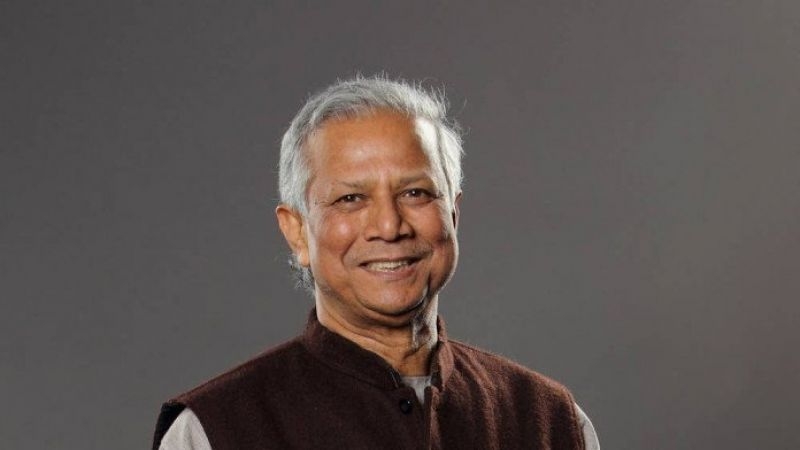- Hasina Gets 10 Years in Purbachal Plot Corruption Cases |
- NASA Finds Ammonia Compounds on Jupiter Moon Europa |
- Remittance Inflow Surges 45% to $3.17bn in January |
- Militant Attacks Kill 33 in Balochistan; 92 Assailants Dead |
- Power generation at Payra Thermal Power Plant 1st unit starts after a month |
We need new economic framework that serves planet, people
Prof Yunus says meeting every year to negotiate is time-consuming, humiliating

Prof Muhammad Yunus
Baku (Azerbaijan) Nov 13 – Seeking a new approach to climate negotiations, Chief Adviser Prof Muhammad Yunus on Wednesday said the world needs a new economic framework in an effort to tackle the climate crisis and create a new civilisation that works for the planet and people.
"We need a new economic framework that serves the planet and the people," he said, adding that he backs the UN-sponsored Summit for the Future to create an economic order for the world's young people.
Speaking at a LDC high-level meeting with UN Secretary General Antonio Guterres on the sidelines of the COP29, Prof Yunus said they have created an economic framework based on consume, consume and consume, and it only generates waste, waste and waste. “We need to create a world of zero waste.”
Leaders of five major climate-vulnerable least developed countries—Nepal, Malawi, Gambia, Liberia, and Bangladesh—joined the close-door meeting.
The Chief Adviser said the climate conference should not be held every year. "We know what the world needs, and we should make a long-term plan for that. It should be country by country. And we have to make a plan for long-term mitigation," Prof Yunus said.
"We don’t need to meet here every year. Meeting every year to negotiate is time-consuming, wasteful, and humiliating,” he said.
The Chief Adviser also called for a new approach to climate negotiations, as the current approach has largely failed to meet the needs of much of the world.
UN Secretary General Antonio Guterres said the LDCs faced the greatest injustice as far as climate change is concerned.
"We want to tell you that we care about you," Guterres said, adding that the LDCs need to do hard negotiations and "serious mechanism” to secure a bigger fund for climate adaptation and mitigation.
A Farmer Can be an Entrepreneur with Access to Credit
Earlier on Tuesday evening, Prof Yunus said the countries should redesign the banking system by following the Grameen Bank model to make credit accessible to farmers, a considerable number of whom are women.
“Every country should have a social business banking law,” he said, while appreciating that currently at least 110 universities across the globe are teaching social business as a course.
Prof Yunus said credit is a human right as it relates to the livelihood of people.
“You cannot establish the right of livelihood without ensuring the right to credit,” said the Chief Adviser while speaking to a side event at the COP29 in Azerbaijan capital Baku.
Bangladesh and the Netherlands jointly hosted the event titled A Global Conversation: Access to Finance for Small Scale Farmers at the Bangladesh Pavilion of the conference.
Additional Foreign Secretary Riaz Hamidullah moderated the event, which was also attended by Dutch Prince Jaime Bernardo of Bourbon-Parma, also the climate envoy of the Netherlands.
The Dutch prince highlighted how credit, insurance, investment, research, and finance increased agricultural output while insisting that millions of farmers across the globe now needed this support.
Speaking at the event, Yvonne Pinto, the Director General of the International Rice Research Institute, said that rice production grew globally ever since credit was made accessible to farmers.
Jorim Schraven, a director of the Dutch entrepreneurial development bank FMO, hailed Prof Yunus for the moral support he extended on debt rights, adding it was related to people’s rights to know.
Farhana Haque Rahman, Senior Vice President of Inter Press Service and Executive Director IPS Noram, said that currently, 550 million small household farmers feed two billion people around the world.
Dr Yunus said a farmer can be an entrepreneur if he or she is given access to credit.
“Every business needs money and investment,” he said, adding that a farmer not only grows crops but also sells them to market.
If he was given access to credit, he could buy crops from other farmers and sell them to improve his life, said Professor Yunus, who is hailed globally as a microcredit pioneer. - UNB

